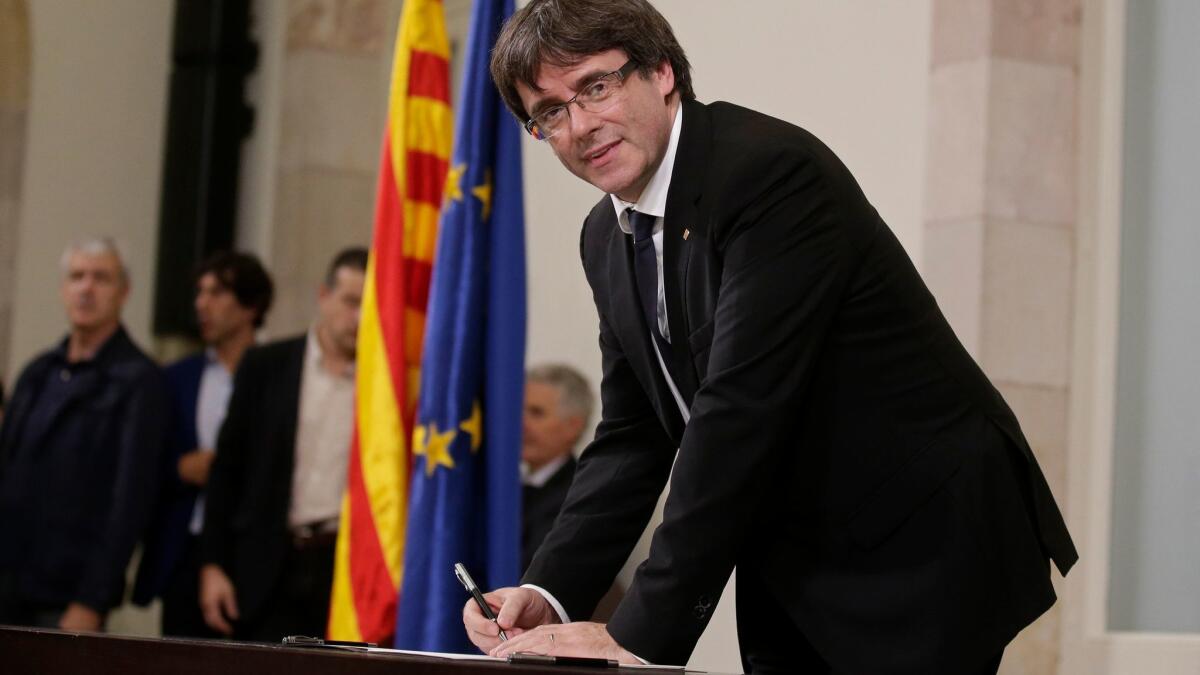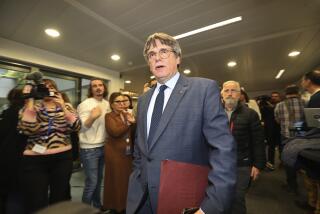Leader of Spain’s Catalonia region faces mounting pressure from all sides

Reporting from BARCELONA, Spain — Catalonia’s leader faced mounting pressure Friday from all sides, with hard-liners in the separatist movement demanding he definitively declare independence from Spain. Spain’s government and the European Union, on the other hand, insisted he must abandon the region’s secession plans.
Spain’s deputy prime minister blamed Catalan President Carles Puigdemont for sinking tourist numbers and for creating such economic uncertainty that a recession could be in the cards. She also said that Spain’s government is considering lowering the growth forecast for the Spanish economy in 2018 if the standoff in Catalonia continues.
“It’s in Puigdemont’s hands” to avoid the extraordinary measures that would allow central authorities a partial or full suspension of the prosperous region’s autonomy, Deputy Prime Minister Soraya Saenz de Santamaria said.
The central government has given Puigdemont a Monday deadline to make clear whether he has already declared independence for the region and to fall in line with Spain’s laws by Oct. 19 if he wants to avoid losing some or all of the region’s autonomous powers.
For Spain, Puigdemont simply has to say one of two words in his response.
“It’s just a yes or a no,” Saenz de Santamaria told reporters after a weekly Cabinet meeting.
In addition to pressure from Madrid, two key allies of Puigdemont’s government called on him to ignore the Spanish government’s threats and press ahead with proclaiming a new republic.
On Tuesday, Puigdemont told regional lawmakers in a speech that Catalonia was proceeding with a declaration of independence from a mandate provided by a disputed referendum held Oct. 1.
But he immediately suspended its implementation for a few weeks to allow for the possibility of negotiations with Spain. The move disappointed some of the hard-liners in the secessionist camp.
Spain considers the referendum to be illegal and unconstitutional, and says its results are invalid. Prime Minister Mariano Rajoy has rejected any possibility of dialogue unless Puigdemont returns “to legality” and takes independence off the table. Rajoy has also said that Spain doesn’t need international mediators to get involved.
If Puigdemont says he did declare independence, then he would have three more days to cancel any secession plans. If he refuses to, or doesn’t answer, Rajoy has threatened to trigger for the first time a constitutional article that could give central authorities power to intervene directly in Catalonia.
The far-left separatist Catalan party CUP said in a letter dated Friday that Puigdemont should ignore the Spanish government’s warning, lift the suspension and definitively proclaim independence.
The Catalan National Assembly, or ANC, a civil society group that organized massive protests in support of secession, also issued a brief statement with a similar message.
“It doesn’t make sense to keep the suspension of the independence declaration” given Madrid’s rejection of any dialogue, the ANC said in the statement.
Some politicians of the two parties in the ruling coalition have also expressed similar views on social media, with only a few of them calling for calm. Catalonia’s government hasn’t given any signal of what it intends to do, but Catalan media reported that closed-door meetings were being held Friday.
Years of growing separatist sentiment erupted on Oct. 1 when Catalan leaders held the banned referendum despite court rulings and fierce opposition from Spain.
About 2.3 million Catalans — or 43% of the region’s electorate — voted amid police violence to halt the referendum. Catalonia said 90% of the ballots cast favored secession, and it declared the results valid. Opponents boycotted the vote.
Starting from a week before the vote, more than 500 companies, including Catalan banks, multinationals and midsize businesses have moved their registered addresses out of the troubled region, Saenz de Santamaria said Friday.
The move is so far mainly symbolic and has limited economic impact because it doesn’t involve relocating offices, jobs or assets.
But Saenz de Santamaria said investment in Catalonia is falling. Citing industry sources, she said the tourism sector in the regional capital, Barcelona, has seen business drop between 20% and 30% in the last month.
The Catalan government is “creating the conditions to plunge Catalonia into a deceleration and even an economic recession,” she said.
Barcelona’s main association of hoteliers and tourist apartment businesses said October bookings so far are down 10% from a year ago. The Hotel Guild of Barcelona blamed the decrease on August’s deadly extremist attack in Barcelona, airport delays and the disturbances caused by secession-related protests.
However, tourists at the city’s beaches and landmarks seemed unbothered by the unfolding political drama.
“If the airports are open and there is not too much going on, we are going to come,” said Kim Russel, a tourist from Denver. “Everything changes sometimes, countries split. Whoever wins that particular battle, I hope there will be peace afterward.”
European Commission President Jean-Claude Juncker joined the appeal for Catalan separatists to drop their secession bid. Though the conflict is a Spanish issue, it could affect the EU by encouraging other places with ambitions of independence, he said.
“I wouldn’t like a European Union that in 15 years consists of 98 states,” Juncker said in Luxembourg. “It’s already pretty difficult with 28.”
More to Read
Sign up for Essential California
The most important California stories and recommendations in your inbox every morning.
You may occasionally receive promotional content from the Los Angeles Times.










